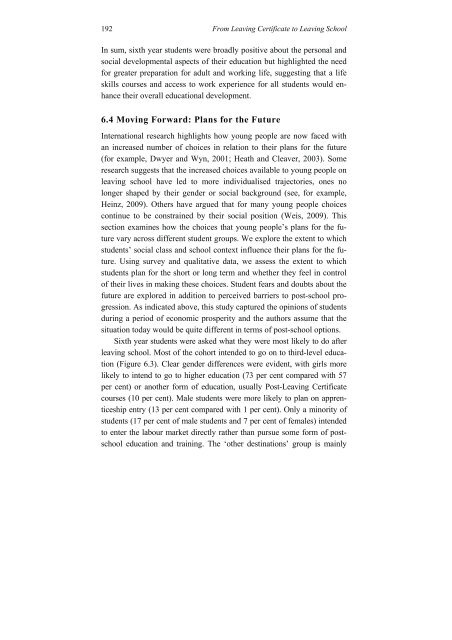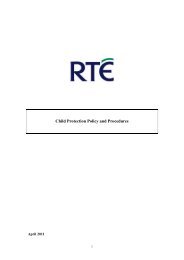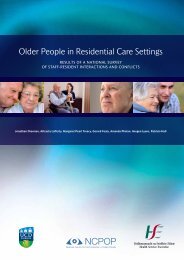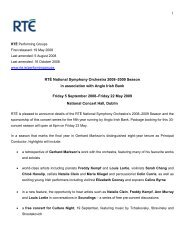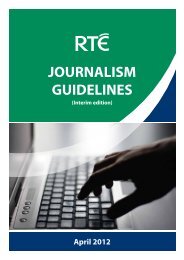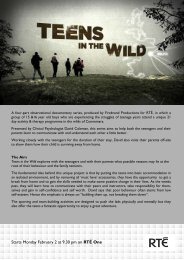From Leaving CertiFiCate to Leaving SChooL a Longitudinal Study ...
From Leaving CertiFiCate to Leaving SChooL a Longitudinal Study ...
From Leaving CertiFiCate to Leaving SChooL a Longitudinal Study ...
Create successful ePaper yourself
Turn your PDF publications into a flip-book with our unique Google optimized e-Paper software.
192<br />
<strong>From</strong> <strong>Leaving</strong> Certificate <strong>to</strong> <strong>Leaving</strong> School<br />
In sum, sixth year students were broadly positive about the personal and<br />
social developmental aspects of their education but highlighted the need<br />
for greater preparation for adult and working life, suggesting that a life<br />
skills courses and access <strong>to</strong> work experience for all students would enhance<br />
their overall educational development.<br />
6.4 Moving Forward: Plans for the Future<br />
International research highlights how young people are now faced with<br />
an increased number of choices in relation <strong>to</strong> their plans for the future<br />
(for example, Dwyer and Wyn, 2001; Heath and Cleaver, 2003). Some<br />
research suggests that the increased choices available <strong>to</strong> young people on<br />
leaving school have led <strong>to</strong> more individualised trajec<strong>to</strong>ries, ones no<br />
longer shaped by their gender or social background (see, for example,<br />
Heinz, 2009). Others have argued that for many young people choices<br />
continue <strong>to</strong> be constrained by their social position (Weis, 2009). This<br />
section examines how the choices that young people’s plans for the future<br />
vary across different student groups. We explore the extent <strong>to</strong> which<br />
students’ social class and school context influence their plans for the future.<br />
Using survey and qualitative data, we assess the extent <strong>to</strong> which<br />
students plan for the short or long term and whether they feel in control<br />
of their lives in making these choices. Student fears and doubts about the<br />
future are explored in addition <strong>to</strong> perceived barriers <strong>to</strong> post-school progression.<br />
As indicated above, this study captured the opinions of students<br />
during a period of economic prosperity and the authors assume that the<br />
situation <strong>to</strong>day would be quite different in terms of post-school options.<br />
Sixth year students were asked what they were most likely <strong>to</strong> do after<br />
leaving school. Most of the cohort intended <strong>to</strong> go on <strong>to</strong> third-level education<br />
(Figure 6.3). Clear gender differences were evident, with girls more<br />
likely <strong>to</strong> intend <strong>to</strong> go <strong>to</strong> higher education (73 per cent compared with 57<br />
per cent) or another form of education, usually Post-<strong>Leaving</strong> Certificate<br />
courses (10 per cent). Male students were more likely <strong>to</strong> plan on apprenticeship<br />
entry (13 per cent compared with 1 per cent). Only a minority of<br />
students (17 per cent of male students and 7 per cent of females) intended<br />
<strong>to</strong> enter the labour market directly rather than pursue some form of postschool<br />
education and training. The ‘other destinations’ group is mainly


